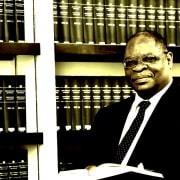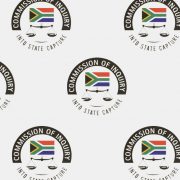|
Getting your Trinity Audio player ready...
|
The week of protests, political war threats and some comic relief – this is how many might characterise the last five days of the commission of inquiry into state capture.
It started with the much anticipated testimony of public enterprises minister Pravin Gordhan on Monday. Over three days, Gordhan gave detailed accounts of instances of interference by former president Jacob Zuma in the appointments of boards of state-owned entities, Zuma’s obsession with the Russia nuclear deal, and his attempt at bullying Gordhan and his former deputy Mcebisi Jonas out of Treasury, among others.
Most of Gordhan’s testimony pertained to his second stint as finance minister – from December 2015 to March last year – but he did take time to provide some background to the policies and culture that he had helped to build in his first five-year term in the office, between May 2009 and May 2014. It was against the backdrop of this culture, that many treasury staff who could have caved in to the pressure of the department’s ongoing capture, simply refused to do so. The attitude amongst many in the department, said Gordhan, was that they could not forsake Treasury, and thus South Africa, in the interest of giving in.
The concept of state capture, he told the commission, is understood to be the manifestation of a network of systems that usually have a sole or few ultimate beneficiaries, with players who play different roles to suit the needs at different levels of the project.
Challengers lining up
Former Sars commissioner Tom Moyane – whose appointment Gordhan touched on, citing irregularities – has applied to the commission for permission to cross-examine the minister. So too has former head of the National Prosecuting Authority, Shaun Abrahams. Both applied in terms of the commission rules that apply to those who are implicated in witness statements.
The pair are not the only ones opposing Gordhan, however. For the duration of his appearance this week, the EFF protested outside the building where the inquiry takes place in Parktown, Johannesburg. On Tuesday, party leader Julius Malema addressed protesters, claiming that Gordhan had no right to cry state capture when he himself was a beneficiary of that system. He declared war against those trying to pull a wool over the poor’s eyes, for the benefit of white monopoly capital.
Malema also condemned commission evidence leader and head of legal Paul Pretorius for not recusing himself from leading Gordhan’s testimony, when he has in the past represented Gordhan’s former spokesperson Adrian Lackay in a separate matter. The fact that the inquiry takes place in a building owned by a media company, Tiso Blackstar, also did not escape Malema’s wrath.
New minister in at the deep end
After Gordhan finished with his testimony on Wednesday afternoon, it was the turn of his former director-general (DG) Lungisa Fuzile, who will probably be remembered most for his amusing accounts of events during the two days in December 2015 that he reported to a new minister, Des van Rooyen.
After then finance minister Nhlanhla Nene – who had succeeded Gordhan – was removed from Cabinet, the lesser-known Van Rooyen replaced him. Van Rooyen had been an MP and member of the standing committee on finance in Parliament until this time. Fuzile told the commission how, on the evening of the announcement, he got a call from ANC NEC member Enoch Godongwana to say that he was getting a “Gupta minister”, referring to Van Rooyen. Godongwana further said Van Rooyen would be bringing advisors that he himself does not know, who were given to the minister.
Fuzile said this did not register until he met Mohamed Bobat at Van Rooyen’s swearing-in ceremony. Bobat introduced himself as the new minister’s advisor, before giving Fuzile an order. It was as if he’d been “hit with a rock between the eyes”, recalled Fuzile, who said nowhere in the history of government had a DG ever taken instructions from a minister’s advisor. The pattern of inappropriateness would continue over the next two days, however, despite the fact that Bobat and another man introduced to Fuzile as Ian Whitley, had no contract certifying them as Treasury staff.
Fuzile described Bobat as a law unto himself, an arrogant figure whose short stay in Treasury would have lasting effects. It was Bobat who leaked a classified document meant specifically for Cabinet, to third parties outside government. If this sensitive information ended up in the wrong hands, said Fuzile, strategic financial decisions and plans of government would be compromised. Bobat sent the document by e-mail to, among others, Trillian CEO Eric Wood. The consultancy company was found to have enjoyed alleged irregular relationships with government entities.
Offering some unexpected comic relief, which commission chair and deputy chief justice Raymond Zondo himself could not resist, Fuzile described how, at his first meeting of Bobat and Whitley, Van Rooyen mixed up the two men’s roles. The minister, overwhelmed and out of touch with his new role, pointed to Bobat and said he was the chief of staff, and to Whitley afterwards, saying he was the advisor. Bobat had to correct Van Rooyen and say their roles were actually the other way around. The error was repeated at a meeting with department executives later that morning.
The gallery found the account amusing, as did evidence leader Vincent Maleka and of course Zondo, who both could not help but chuckle under their breaths.






